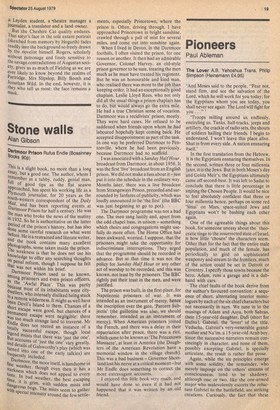Stone walls
Alan Gibson
Dartmoor Prison Rufus Endle (Bossinney Books 90p)
This is a slight book, no more than a long essay, but a good one. The author, whom I remember as a tubby, ruddy, genial man, full of good tips as the flat season approached, has spent his working life as a IlYmouth journalist, for 20 years as the south-western correspondent of the Daily Alai', and has been reporting events at uartmoor Prison for half a century. He was the man who broke the news of the mutiny In 1932. So he is authoritative on the latter Period of the prison's history, but has also done some careful research on what went L "efore. He is a restrained and literate writer, and the book contains many excellent Photographs, some taken inside the prison. The weakness is that he does not use his knowledge to offer any searching thoughts Pn penal reform, though I suppose he felt that was not within his brief. Dartmoor Prison used to be known, among prisoners and even prison officers, " the 'Awful Place'. This was Partly because most of its inhabitants were cityOWellers, who intensely disliked being stuck M a remote wilderness. It might as well have been Devil's Island to them. Chances of a short escape were good, but chances of a Permanent escape were negligible: there w_as too much strange land to traverse. Mr todle does not record an instance of a totally successful escape, though local legend insists that there was `just the one'. But accounts of 'just the one' vary greatly, and details of Galsworthy's play (which was turned into one of the early talkies) are frequently included. Dartmoor, the moor itself, is handsome in fine weather, though even then it has a starkness which does not appeal to every taste In bad weather, the best escaping time, it is grim, with sudden mists and dangerous bogs. The mists seem to gather with special intensity around the few settle ments, especially Princetown, where the prison is. Often, driving through, I have approached Princetown in bright sunshine, crawled through a pall of mist for several miles, and come out into sunshine again.
When I lived in Devon, in the Dartmoor foothills, I often visited the prison, for one reason or another. It then had an admirable Governor, Colonel Harvey, an old-style prison governor to be sure. treating the men much as he must have treated his regiment. But he was an honourable and kind man, who realised there was more to the job than keeping order. It had an exceptionally good chaplain, Leslie Lloyd Rees. who not only did all the usual things a prison chaplain has to do, but would always go the extra mile.
He had a true Christian sense of vocation. Dartmoor was a recidivists' prison, mostly.
They were hard cases. He refused to be saddened when friends upon whom he had laboured hopefully kept coming back. He accepted disappointment as part of the task. In one way he preferred Dartmoor to Pentonville, where he had been previously, because Dartmoor had no scaffold.
I was associated with a Sunday Half Hour, broadcast from Dartmoor, in about 1956. It was the first 'live' broadcast from an English prison. We did not make a fuss about it —just put it into the schedule in the ordinary way. Months later, there was a live broadcast. from Strangeways Prison, preceded and surrounded by fanfares of publicity, which was loudly announced to be 'the first' (the BBC was just beginning to go to pot), The Dartmoor programme was not a bad one. The men sang lustily and, apart from the odd chapel bass, in unison — something which choirs and congregations might usefully do more often. The Home Office had been awkward, worried, I suppose. that the prisoners might take the opportunity for indiscriminate interruptions. They urged that the programme should be recorded in advance. But at that time it was not the policy for Sunday Half Hour or any other act of worship to be recorded. and this was known, not least by the prisoners, The BBC rightly put their trust in the men, and were justified.
The prison was built, in the first place, for Napoleonic prisoners of war. It was intended as an instrument of mercy. hence the inscription over the gate. 'Parcere Subjectis' (the guillotine was also, we should remember, intended as an instrument of mercy). When American prisoners joined the French, and there was a delay in their repatriation after peace, there was a riot. which came to be known as 'The Princetown Massacre', at least in America (the Daughters of the American Revolution have a memorial window in the village church). This was a bad business — Governor Shortland lost his nerve at a critical moment — but Mr Endle does something to correct the more extravagant accounts. I enjoyed this little book very much, and would have done so even if it had not happened that it was written by an old friend.






























 Previous page
Previous page